-
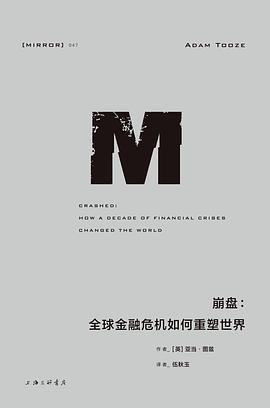
崩盘
《崩盘》是关于全球化时代第一场世界性金融海啸的史诗,也是一部惊心动魄的当代史。
作为对20世纪历史有精深研究的杰出历史学家,亚当·图兹采用全球视角,详细叙述了2008年金融危机和欧元区危机及其后错综复杂的世界历史。他不仅从金融学的角度解释危机爆发的技术性原因,还花很大篇幅阐述危机对这十年来世界政治形态的塑造,呈现了丰富的原创性主题:经济发展的无序和债务流动的不稳定;单个国家和地区通过金融上的相互依存关系、投资、政治和武力以无形的方式联系在一起,形成的不平衡关系;金融危机与社交媒体的蓬勃发展之间的相互影响;美国中产阶级的危机;中国的崛起;围绕石油天然气等石化能源资源展开的争斗。
尽管最初有人试图将金融危机淡化为地方性事件,但亚当·图兹认为,2008年开始在华尔街发生的金融危机,实际上是一个具有全球意义的转捩点,从英国和欧洲的金融市场,到亚洲、中东和拉丁美洲的工厂和造船厂,全球治理不得不做出重新调整和安排。在美国和欧洲,资本主义民主面临挑战,引发了乌克兰的内战、希腊的混乱、英国脱欧、特朗普的崛起和各国民粹主义的抬头,西方世界遭遇了冷战结束以来的最大危机。
危机席卷而来,世界格局、全球经济和我们的生活都发生了翻天覆地的变化,十多年之后的今天,我们可以说危机已经过去了吗?我们有能力和信心应对下一场全球危机吗?
-
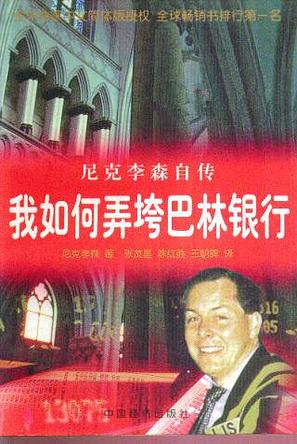
我是如何弄垮巴林银行的
自序 通常,在一本书的开头,作者都要写上一篇简短的献词,但是, 我并不打算这么做,因为写这本书的目的只是重录我的生命中并不怎 么光彩的一段经历,再现一段我一直想要忘却的历史,因此,我觉得 ,没有必要也不应该把它献给任何人。 既然如此,那么我便借了写这本书的机会,着重展现一些事件的真实面貌。譬如,在书中,我引用了英格兰银行的报告,但那并不意味着我同意其中的观点。并不是这样的。那份报告只不过废纸一一张──跟新加坡提交的那一份报告比起来,它让人感到羞愧。 另外,我认为还有必要问英格兰银行和“打击严重欺诈行为办公室”(SFO)几个层次较高的问题。他们对这些问题都避而不谈,譬如,在巴林银行倒闭后,为什么还会引起五千五百万英镑的货币损失?那些所谓的“专家”是否有能力对那些货币进行有效的套做交易?或者他们只是在进行赌博? 我没有被遣送回英国去接受审讯,这其中有好几个原因。我不想谎称我对此决定背后的内幕不知或者不懂。但我想告诉大家这么一个事实:新加坡政府在他们提交的报告中提出,他们被禁止接触英国人掌握的大部分能用作证据的文件。而在我被扣留在德国期间,SFO所 做的陈述与此正好相反。 写本书的目的并不在于暴露内幕。但是我仍怀疑它会导致新闻媒体的热烈炒作,就像读者们常常见到的那样。只是这一次的故事却是 完全真实的。在写这本书时,我一直坚持着“真实”的原则,以告诉 读者事情的真实面目。书中提到的一些人可能会因为我的描绘方式感 到不安,但是,在将书读过多遍之后,我觉得我的描绘应该是公正的。为了不伤害别人,我在书中两次使用了化名。好在这两个人算不上 书中的主要人物,也不会想到我会在这本书中提及他们。所以,我想 这个处理方法应该是妥当的。 借此机会,我想向一些人表达我的谢忱。首先我要感谢爱德华怀特利先生,是他帮助我写成了这本书。这不是件容易的事,但是监狱当局格外帮忙,允许他一次一次地来探视我。但愿他日后一切顺遂。 我还想对我的律师们表示感谢,尤其是史蒂芬波拉得、阿伯哈特凯普夫和爱娃丹宁弗尔德。是他们接了我的案子,帮我打完了那场官司。第一次入狱时,有人对我说:“现在你可以看出谁是你的朋友了。”这绝对是至理真言。朋友们的帮助和支持使我深受感动。但是,我又无法一一回信──朋友们的来信实在大多了──我只能在此感谢所有给我写信的人。我未曾收到过指责我或批评我的信,但我确实对我以前引为“朋友”的一些人感到深深的失望。尽管大多数朋友都抗拒了悬赏的诱惑,但还是有叁个人将自己出卖给了报社,我不想说出他们的姓名──我不想将自己降低到他们的等级──但是,我想,他 们一定会为自己的行为感到羞愧难当的。 我想感谢我所有的家人和所有的好友,他们一如继往地支持着我。他们的爱是我的精神支柱。要是没有他们的爱和帮助,我肯定无法坚持到现在。这又谈何容易!对我而言,适应现在的环境是一个漫长而艰难的历程,但是,你们之中的每个人都给了我不小的帮助,让我终于重新站了起来。 最后,我要对我的妻子丽沙说声“谢谢”。在整件事情中,她都是我的力量泉源,在我处于人生低谷的时候,她总是不断地激励着我。现在,我唯一的愿望就是安心服刑,尽快回到她的身边。我是世界上最骄傲的丈夫。 -
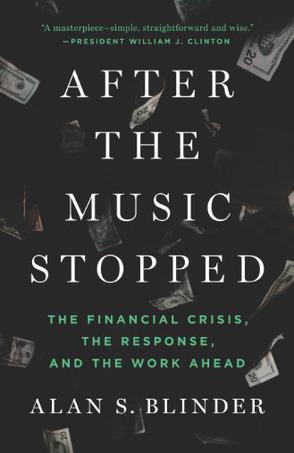
After the Music Stopped
One of our wisest and most clear-eyed economic thinkers offers a masterful narrative of the crisis and its lessons Many fine books on the financial crisis were first drafts of history—books written to fill the need for immediate understanding. Alan S. Blinder, esteemed Princeton professor, Wall Street Journal columnist, and former deputy chairman of the Federal Reserve Board, held off, taking the time to understand the crisis and to think his way through to a truly comprehensive and coherent narrative of how the worst economic crisis in postwar American history happened, what the government did to fight it, and what we can do from here—mired as we still are in its wreckage. With bracing clarity, Blinder shows us how the U.S. financial system, which had grown far too complex for its own good—and too unregulated for the public good—experienced a perfect storm beginning in 2007. Things started unraveling when the much-chronicled housing bubble burst, but the ensuing implosion of what Blinder calls the “bond bubble” was larger and more devastating. Some people think of the financial industry as a sideshow with little relevance to the real economy—where the jobs, factories, and shops are. But finance is more like the circulatory system of the economic body: if the blood stops flowing, the body goes into cardiac arrest. When America’s financial structure crumbled, the damage proved to be not only deep, but wide. It took the crisis for the world to discover, to its horror, just how truly interconnected—and fragile—the global financial system is. Some observers argue that large global forces were the major culprits of the crisis. Blinder disagrees, arguing that the problem started in the U.S. and was pushed abroad, as complex, opaque, and overrated investment products were exported to a hungry world, which was nearly poisoned by them. The second part of the story explains how American and international government intervention kept us from a total meltdown. Many of the U.S. government’s actions, particularly the Fed’s, were previously unimaginable. And to an amazing—and certainly misunderstood—extent, they worked. The worst did not happen. Blinder offers clear-eyed answers to the questions still before us, even if some of the choices ahead are as divisive as they are unavoidable. After the Music Stopped is an essential history that we cannot afford to forget, because one thing history teaches is that it will happen again. -
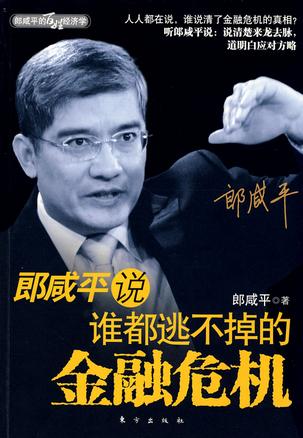
郎咸平说:谁都逃不掉的金融危机
“你是不是像我在太阳下低头,流着汗水默默辛苦地工作”?你是不是也曾经像这代人一样心怀一个简单而淳朴的梦想:只要努力打拼,就能“追求一种意想不到的温柔”?为此,你“就算受了冷漠,也不放弃自己想要的生活”。 可血淋淋的现实摆在你面前:企业倒闭,百业萧条,更可怕的是过去那种简单的生活一去不复返了!中国35%的经济产出都要依靠外贸出口,而这些产出所依赖的终端消费形态,随着全球金融危机的一步步恶化已经没有往日的风光。美国次贷危机对我们的冲击到目前为止是有限的,还没有真正开始,真正的开始会是什么时候?就是美国的防火墙破裂之后。美国的防火墙一旦破裂,冲击到美国的消费市场,由于美国进口的减少,使我们的出口受到影响,从而打击到我们经济的基本面。 -
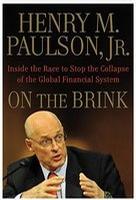
On the Brink
When Hank Paulson, the former CEO of Goldman Sachs, was appointed in 2006 to become the nation's next Secretary of the Treasury, he knew that his move from Wall Street to Washington would be daunting and challenging. But Paulson had no idea that a year later, he would find himself at the very epicenter of the world's most cataclysmic financial crisis since the Great Depression. Major institutions including Bear Stearns, Fannie Mae, Freddie Mac, Lehman Brothers, AIG, Merrill Lynch, and Citigroup, among others-all steeped in rich, longstanding tradition-literally teetered at the edge of collapse. Panic ensnared international markets. Worst of all, the credit crisis spread to all parts of the U.S. economy and grew more ominous with each passing day, destroying jobs across America and undermining the financial security millions of families had spent their lifetimes building. This was truly a once-in-a-lifetime economic nightmare. Events no one had thought possible were happening in quick succession, and people all over the globe were terrified that the continuing downward spiral would bring unprecedented chaos. All eyes turned to the United States Treasury Secretary to avert the disaster. This, then, is Hank Paulson's first-person account. From the man who was in the very middle of this perfect economic storm, ON THE BRINK is Paulson's fast-paced retelling of the key decisions that had to be made with lightning speed. Paulson puts the reader in the room for all the intense moments as he addressed urgent market conditions, weighed critical decisions, and debated policy and economic considerations with of all the notable players-including the CEOs of top Wall Street firms as well as Ben Bernanke, Timothy Geithner, Sheila Bair, Nancy Pelosi, Barney Frank, presidential candidates Barack Obama and John McCain, and then-President George W. Bush. More than an account about numbers and credit risks gone bad, ON THE BRINK is an extraordinary story about people and politics-all brought together during the world's impending financial Armageddon. -
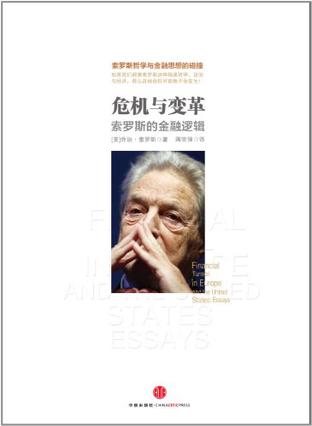
危机与变革
《危机与变革:索罗斯的金融逻辑》呈现了2008年金融危机发生之后,索罗斯对应对金融危机的实时思考,将他的哲学思想与美国、中国、欧洲各国对银行业和金融业进行的结构调整措施相结合,深刻挖掘当前危机的历史根源与现实要素,并呼吁国际社会同心协力应对这场危机。 在描述危机演变历程的同时,索罗斯常提出与美国和欧洲各国所选政策不同的政见,字里行间无不透露着他对欧元区以及美国未来前景的担忧。索罗斯高瞻远瞩地预见到这场危机的规模,并认识到人类将面临“非常时期”。作为一名从业多年的基金经理以及欧洲一体化的支持者,索罗斯的分析令人信服。他表示,当前全球资本市场和实体经济正面临危机带来的最严峻的考验,各个国家应该重塑金融监管环境,共同破除“金融魔鬼”带来的魔咒,抵制人性的贪婪。